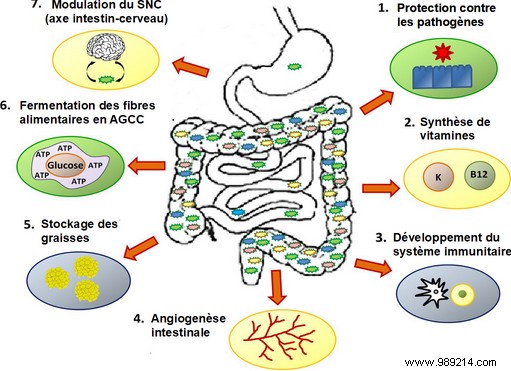Over the decades, science has established links between the gut microbiota and aging. A recent study reveals microbiome transplants in mice. The goal ? Reduce the effects of aging on the brain.
Ilya Ilyich Metchnikov (1845-1916) was a zoologist, bacteriologist and immunologist under the Russian Empire. In 1895, the interested party had suggested that certain populations of Eastern Europe lived longer for a particular reason. These feed on a large quantity of fermented foods, in particular containing lactic acid bacteria . So this is a theory linking gut microbes to healthy aging.
Widely ignored for decades, this idea has gradually resurfaced. Today, Science recognizes the importance of the gut microbiota in the regulation of health and disease . Studies have shown that the diversity of bacteria can affect health as we age. Others believe that age involves changes in the microbiota and the immune system. In other words, the microbiota could be associated with cognitive decline.
Some works even assume that a specific diet to the billions of microbes in our guts could mitigate the effects of brain aging. A study led by neurologist John Cryan of University College Cork and published in the journal Nature Aging August 9, 2021 goes one step further.

John Cryan's team says they have transplanted the microbiome of young mice in older specimens. By examining these, the researchers found that it was possible to reverse many of the effects of old age on learning, as well as memory. The results show that the chemicals present in the hippocampus were closer to those of the young mice after transplantation. In conclusion, the microbiome would be essential for brain health , especially when the subject has reached a certain age.
This latest study therefore seems to validate the principles of Ilya Ilitch Metchnikov. He thought that staying young was through the protection of intestinal bacteria . Nevertheless, since the tests have been carried out in mice, can the theory in question really concern humans? Further studies obviously need to be conducted, particularly regarding the ability of gut bacteria to fight certain characteristics of brain aging.
Finally, this type of work does not give hope for fecal transplants in humans to rejuvenate the brain. On the other hand, the research could lead to the development of dietary treatments (or bacteria) concerning the microbiota. The objective? Promote the optimization of intestinal health and immunity in order to maintain a healthy brain.